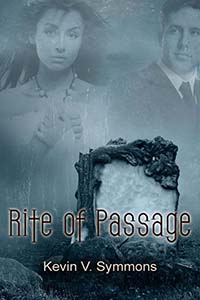As many of you know more than ten years ago I received notification that my paranormal novel, Rite of Passage was coming out in print… that afternoon. After practically driving off the road with unrestrained enthusiasm (I was on the highway at the time) I called several writing friends and my family to share the good news. As they had throughout the submission and publishing process, all shared in my excitement.
We all have rosy images of what selling and publishing a novel will be like. Most of us have seen what allegedly happens in the movies or on TV. Allegedly is the operative phrase here since the reality of it all can be far different.
Am I about to engage in a pity party, decrying all publishers and those on the periphery such as agents and editors? Absolutely not. Truth be known, the whole process was almost the way I envisioned it. For much of my pre-publishing life I had the privilege of being surrounded by intelligent, savvy fellow writers. I have been fortunate to retain the services of a fine publicist and my publisher, editor, and marketing director have been nothing short of phenomenal. My family has never been anything but very supportive.
So what’s the point here? Despite all the above it is still a daunting experience. Especially in my case and that of several writing friends whose print books were released early or out of synch with their eBooks. The truth is that you are never totally prepared. I know I wasn’t.
Rather than spend the next several paragraphs groaning, let me share a little of what I’ve learned:
Rejection—you thought it was bad receiving those terse emails saying. “Your novel isn’t in our plans.” Wait till you’re faced down by indie bookstore owners and librarians who have neither the time, space nor interest to talk with you. Get over it! Move on. Sadly, though there are many enthusiastic, supportive bookstore owners and librarians, for the new or even mid-list author it is difficult today to make a career of selling books the traditional way; by meeting readers and pressing the flesh.
Social Media—Here’s a partial answer to the dilemma above. It is not the method I would choose, but it is no longer in question. Even if you are surrounded by those willing and able to market your book along traditional lines, your sales will grow exponentially thanks to your website, Facebook, Twitter, Goodreads, Instagram. and other avenues of publicity and sales on the Internet. And remember, these are tools to sell your book(s) not your vacation in Cancun, your pet Airedale or you latest grandchild. They (especially your website and your Facebook author page) must be dynamic and look professional. Change the messages and pictures often, try to provoke discussion about your book’s subject. Encourage reviews and comments that pertain to your work. And of course, sharing an occasional “well-done” about writing friends is always good form.
Perseverance—You should have learned this lesson early in the process of attempting to sell your book(s), but it is no less important once you have your work in print, eBook, or both. Let’s add tenacity, drive, or whatever word you chose to describe it. Point is, do not give up. With thousands of authors vying for shelf space, reading or presentation opportunities and most importantly the attention of readers you must be a salesperson, but you must be firm, perhaps downright aggressive without being perceived as a nuisance. Bookstores, especially local ones are fighting an uphill battle against the Internet and I suggest using author loops: joining available professional writing associations (MWA, SIC, RWA, NWU, etc) and often, your publisher. They offer learning and sales opportunities not available to the uninitiated. Use your creativity. Develop a presentation that you can give to a local reading group or one of those professional organizations already mentioned. They give you immediate credibility and name recognition. Launch parties—another great way to introduce yourself and your book. Ask reading friends where they would like to see you introduce your work. You may be surprised by their answers. Libraries and bookstores are traditional answers but what about local theme other than those two. Thanks to an imaginative publicist I’ve done events at restaurants, coffee shops, high-end wine stores and venues that dovetail with your books theme?
Never Stop Learning—Perhaps the most important thing you can do. Hopefully, if you’ve published a book, you can draw on the same drive, initiative, and success you may have had in your previous career. And… your best resource… draw on the experience and knowledge of your fellow published authors.
Good luck and let me know your thoughts…
Kevin
On Novel Writing
For those who don’t know me I’ve spent the last decade and a half working as a novelist, junior college faculty member, and speaker helping aspiring novelists achieve their goal of being traditionally published. Here are my suggestions:
Find books on writing and read them. There are several excellent ones. Don’t rush through them but read them thoroughly, then re-read them (see the brief list below).
The Internet has had a negative impact on print writing magazines, but The Writer, Writers Digest, and Publishers Weekly are still quality resources. They offer fine articles on many writing subjects.
Even if you’ve been exposed to creative or novel writing classes take a refresher. Many towns or colleges offer adult education courses on creative writing. I taught one for many years.
Attend workshops or conferences as well. Not only do they offer some excellent learning opportunities, but you’ll find them a great networking resource… then join the organization that sponsored them. They may be genre specific (romance, mystery, thrillers, etc.) or be offered by a broad-based writing organization.
Attend their meetings (above in 4). Talk with other writers, make friends, and get to know the members. Most will enjoy offering advice or tips to an aspiring writer.
If you have the resources find a respected writing coach or editor. But make sure you vet them thoroughly. Sadly, there are too many people who’ll take advantage of your desire to get published.
Through the friendships you build, find a writing or critique group to review your work. You may find one in your genre or a mixed group. Either can work but try them out to make sure they’re a good fit
Visit your local library or community center if an author is speaking. Most, even the most successful ones, will be happy to offer you ideas.
Never bring your work to an event unless the presenter has solicited it. Most might take your work to avoid an uncomfortable situation, but I guarantee you will never hear from them.
Even if you have nothing ready for submission, I always advised my students to have business cards printed. They not only signal that you are serious but give you a sense of pride.
The following are my suggested reading references;
A Writing the Breakout Novel* by Donald Maass
B On Writing* by Stephen King
C Writing and Selling Your Mystery Novel by Hallie Ephron
D (Annual) Guide to Literary Agents by Writers Digest
E Writing Fiction* by Janet Burroway
F Reading like a Writer by Francine Prose
G The Portable MFA in Creative Writing by New York Writers Workshop
The starred titles are my favorites.
I will leave you with this: Writing a novel and getting it traditionally published is difficult. Do not approach it lightly. Everyone I know who achieved that elusive goal spent endless hours writing and re-writing and years submitting. If you believe in your work—never give up.
Good luck!
Kevin

